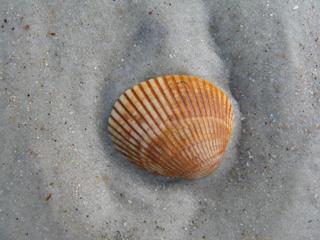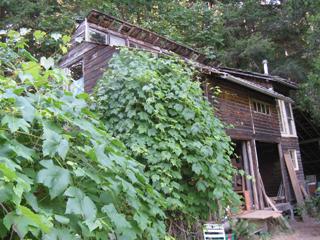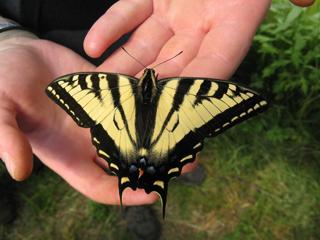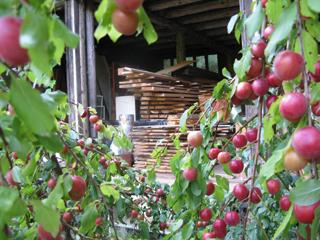By Chris Roth




Among [people], it seems,…processes of co-ordination and disintegration follow each other with great regularity, and the index of the co-ordination is the measure of the disintegration which follows….There is no lostness like that which comes [to a person] when a perfect and certain pattern has dissolved….
—John Steinbeck
All changes, even the most longed for, have their melancholy; for what we leave behind us is a part of ourselves; we must die to one life before we can enter another.
—Anatole France
If, every day, I dare to remember that I am here on loan, that this house, this hillside, these minutes are all leased to me, not given, I will never despair. Despair is for those who expect to live forever. I no longer do.
—Erica Jong
What we call the beginning is often the end
And to make an end is to make a beginning.
The end is where we start from.
…
We shall not cease from exploration
And the end of all our exploring
Will be to arrive where we started
And know the place for the first time.
—T.S. Eliot, “Little Gidding” (from “The Four Quartets”)
● ● ●
I lie in bed, contemplating: My existence is a miracle. Your existence is a miracle. Existence itself is the unlikeliest of dreams.
We might feel separate in our individual lives, but in fact we are all family, fellow travelers on a planet that was once only a possibility and will one day be just a galactic memory, consumed by an aging sun. We inhabit bodies that each have a birth and a death, and we each experience countless endings and beginnings, small and large, throughout our lives. Every one of us is a dance of spirit, part of an interspecies ballet, buffeted before and after by nothing we understand consciously. And while we like to think about the past and the future, all we experience is actually the present, and it’s just as real as any present ever was or will be.
We are children not just of our parents, and related not just to one another: we are the remnants of supernovas, stardust reconfigured, alive only because past forms of cosmic manifestation died to create us.
Community isn’t just an idea: it’s the logical result of the Big Bang. It is the Big Bang, continually playing out.
“I” is just my way of participating in all this. It’s temporary, like everything anyone has ever experienced, or ever will.
And it’s no different from “we.”
I didn’t always think this way. Lots of endings and beginnings had to happen in my life for me to reach this conclusion. My accustomed reality had to shatter in various ways, multiple times, for me to understand how much we all have in common.
Even now, it can be easier to recognize and feel this sense of unity and connection while lying in bed on a beautiful rainy Oregon morning than when stuck in a traffic jam or confronted with a difficult personal interaction. How can I be kin with this person who appears to be mocking me? Or with the new visitors whose pet monkey just bit a community resident and who then, instead of apologizing, became belligerent themselves and had to be escorted off the property? Or, on a larger scale, with people who say and do things that seem entirely out of alignment with my own values and vision for the world?
And yet, we are kin. Below the judgments, below the ways we each play out our pain, we are human beings, manifestations of life. We reflect one another’s pain, and we can alleviate it once we see it as our own. Even as we learn hard lessons by hurting and being hurt, we are miracles in our own right. We are each simultaneously “nothing special” and exceedingly special, if we can realize our own natures.
The Compost of Loss
Gratitude sometimes need to grow in the compost of loss. Often new paths come only when we reach a dead end. Fear, insecurity, judgment/self-judgment, and competitiveness are some of the dead ends down which I’ve wandered, separating me, at least temporarily, from the full embrace of life. Symptoms have included: grasping for what I seem to lack, rather than recognizing and experiencing abundance…holding onto fantasies that have expired, rather than seeing the promise of renewal through change…taking health, family, friends, and positive circumstances for granted, and noticing what appears to be “wrong” rather than all that is “right”…holding myself and my situation to impossible standards, feeling never good enough…believing that aging and mortality are illusions, to which I might be immune…or, at other times, seeing mortal life as a trial, and imagining that something better awaits…failing to accept and express the full range of emotions that we each experience, including sadness and tears…not seeing every moment as precious, an opportunity to express love for others and for life.
Community has brought me face to face with all of these symptoms, and also provided many of the experiences of change and loss, endings and beginnings, through which I’ve grown toward gratitude.
Personal Transitions
While community-seekers may imagine intentional community as a place to escape from a world that seems to be either changing too rapidly (leaving us and nature in the dust) or stuck in a stultifying status quo (keeping us locked up in boxes), community is anything but that. After three decades in conscious pursuit of “community,” I am convinced that life in community is simply a microcosm of the larger world, in which we cannot escape either inner or outer change. Our job is to learn to navigate these changes gracefully, to accept rather than to resist, to embrace the unfolding of life rather than protest its evanescence.
Over the past three years, I’ve experienced more intense change and transition than I’d known at nearly any other time in my life. I watched the community I’d lived in for more than a decade appear to dissolve into not even a shadow of its former self—becoming an unhealthy, stress-filled workplace, largely ineffective in its mission, rather than the nurturing, dynamic community and learning center it had once been—and at the same time realized I’d fallen into a rut both in my role there and in my personal life. Population turnover had been complete since my arrival—in fact, many waves of members had come and gone—and the community culture, which I’d appreciated for most of my time there, had ultimately, from my perspective, “gone south.” In search of greener pastures, and feeling the need for radical change in my life (the kind I didn’t believe I could achieve by staying put), I left not only my home community but my home bioregion, with no plans to return.
I ended up making important new connections and appreciating my adventures elsewhere (living at two different communities and getting to know two others), but ultimately feeling out of place in my new location and longing for my former home. During my absence, my long-term community had completed its meltdown, nearly folded, and thankfully was resuscitated by some new residents who had more energy to give it than I had by the time I left. They made radical, revolutionary changes that intrigued me and brought the community back much closer to the feeling and values that had drawn me there in the first place more than a decade earlier. I returned to a small group that soon included only one other member who predated my departure. For a while it seemed like a ghost town, but now it only seems that way if I think of all the people who used to live here, instead of all those who do now.
Simultaneous with these changes, and after a couple decades of being in denial of the process of aging, I suddenly found my body refusing to cooperate with my familiar role of being a nearly full-time organic vegetable gardener. As my knee condition worsened, I finally found, much to my displeasure, that I could not garden at all, putting a serious dent into my sense of identity, of relationship to the earth, and of making a meaningful contribution to the world.
Self, Earth, and Purpose
Up until then, I had often kept myself feeling good by attending to things outside of myself, rather than attending to myself. Especially when I felt disconnected from others, true self-care took a back seat to accomplishing something “worthwhile.” I saw my body as an instrument to grow food, and found some strange sense of satisfaction in pushing it past its limits in that endeavor. Finally, this approach to life and to my body had to end. Out of its ashes, I’ve come to realize that caring for my body is inseparable from caring for the earth—that I am the earth, not something to be sacrificed upon the altar of the earth. Ironically, it’s taken several decades of sometimes overenthusiastic, addicted, martyrdom-flavored organic gardening to help me see that any truly organic, sustainable way of feeding ourselves requires us to be just as gentle with ourselves as we are with the earth.
I’ve spent much of the last couple years focused on healing a knee problem that not only threw a wrench into my former identity but brought me a whole new perspective on life and my body. At times I experienced chronic pain that became debilitating not only physically but emotionally. Coinciding with so many other elements of my life changing and appearing to dissolve, my failing body gave me a new understanding of “overwhelm”—even of despair. It brought me face to face with feelings of shame, with my own weaknesses, with the isolation I had actually felt, to some degree, all along. And ultimately it allowed me to understand others’ pain as I’d never understood it before.
It made it impossible for me to be “perfect,” to sacrifice myself to some higher cause, to transcend my human nature or even imagine that that was possible. My body’s saying “no” cut through my sense of pride and purpose, shaking me loose from my former patterns of self-neglect and overdependence on work as a way to boost self-esteem. It dissolved my “steadiness” in the face of change and my apparent immunity to uncertainty. It made me realize that we each face challenges, that we are here not to achieve the impossible or fit into some preconceived, ideal role, but to support one another in the messiness of pain, change, loss, and renewal.
It forced me to find compassion for myself, and in the process awakened true compassion (not just duty-driven or loftily conceived compassion) for others. It helped me realize that we are all brothers and sisters—not just because some songs from the 1960s say so, but because it’s true. Love—the authentic expression of love, for ourselves, for others, for our world—is all we can hope to accomplish, and the best and only thing worth accomplishing. It can look many different ways, and it can incorporate our values, our abilities for critical thinking, our special talents, our unique gifts—but underneath, it’s the heartbeat that keeps us going, that keeps our spirits busy being born rather than busy dying.
Endings and Beginnings in Community
Not being tied to a garden over the last couple years has also allowed me to step back, revisit and reflect on the many community experiences I’ve had. Each one has been born from an ending; each one has seemed like a new beginning; and, after many endings and beginnings, each has made way for something new.
Every community experience has begun for me as an idealized dream, then, usually, transformed into something even more rewarding than what I had imagined. Eventually, I, the situation, or both have evolved in ways that no longer make us a good match. By all evidence, this is a common pattern, especially in communities not based on ownership. I have always been free to move on, and in reflection, I’m grateful for the many amazing places I’ve lived (sometimes for long periods), groups I’ve been part of, experiences I’ve had as a result. If change is the nature of life, community is a particularly good way to come face-to-face with that reality.
Revisiting the Ecobus
My first major “new beginning,” and first truly intentional community experience, came after my former identity as an obsessive student no longer lined up with who I felt I was. Once separated from my family, hometown, and familiar identity when I left for college, I discovered I was strangely unprepared for the personal challenges this caused, and after two years made a radical shift in educational direction by joining a small, ecologically-focused traveling learning community. (For much more about this experience, see “Power and Disempowerment on the Ecobus,” Communities #148; see also “How Ecology Led Me to Community,” Communities #143.) This program suffused me not only with a new environmental awareness but also with a determination to pursue a life in harmony with others and the earth. It laid the foundation for most of my pursuits since then.
Until recently, I thought of those years infrequently, usually only when encountering former students from the same program. But this past year I’ve attended two alumni reunions and even revisited the former headquarters of the school. I’ve learned much more about the history of the program, both before and after my attendance. Like the other communities with which I’ve been deeply involved, it’s gone through major upheavals, including challenges that threatened to shut it down entirely (and, in its case, eventually did). And now, from the embers of the old program, a new program is emerging.
I had several experiences this summer which showed me just how much things had changed over the past three decades. The former headquarters now appeared to be a ghost town: a place that had been crawling with guides, students, and activity was virtually abandoned, with a crumbling cabin greeting my arrival. Much more encouraging was my reunion with my former guide, of whom I’d lived in fear (among other things) for my two years in the bus community. Reuniting nearly 30 years later, I discovered that he now felt much more like a peer, a fellow traveler, a true friend, than an authority figure. We talked, laughed, and shared stories for an entire afternoon, reflecting on our past follies and the lessons we’d learned over these many intervening years.
Fortunately, as my visit to its new headquarters also revealed, the revived program reflects the collective evolution in consciousness that our own individual evolutions mirror. The new “Ecobus” is considerably more holistic than the one I rode on.
Ghost Town or Downtown?
Likewise, I’ve made frequent visits over the past year to another sustainability-focused community with which I was deeply involved for much of a decade. It too has experienced major upheavals and nearly shut down more than once. Many amazing people have lived and worked there for a time, then moved on—sometimes inspired, sometimes frustrated, sometimes both—bringing with them the influence of their time there as they join or create new projects or become members of a wider community. For me, walking on that land can also be like walking through a ghost town—if I simply imagine all the people I’ve known who’ve lived there, or if I visit the parts of the land where remnants of the old, unpermitted dwellings still stand (or lie). Yet the place is vibrant today with new activity, as engaged in its teaching mission as it’s ever been, making real differences in many lives. It has risen from its own ashes again and again.
Many other groups I know have gone through similar things. On visits to other communities, even without knowing all the personal details, I’ve found that the buildings left behind by former residents speak volumes about the changes a group has been through. When the community is in a “lull,” I can well imagine how it, too, must seem like a ghost town to those who live there, or who once did.
At Home in Community
And, of course, there’s my home community, already described, which has experienced as many changes and challenges over the years as any of these others (and which also has created many positive “ripple effects” throughout the region and world via former residents and program participants affected by their experiences here). I’m still unsure of how, or how well, I’m adapting to all those changes. I am trying to live in the present—something made easier by how different my life is now than it was during my hard-core gardening phase. In general, I find it much easier to appreciate and be with people than I did when I was always feeling the need to do more, when I was spending so much time trying to justify my existence. I find it a lot easier to experience wonder and love for what is.
I have also shaken up my idea of what “community” means for me, and of who my community is. The residents of my home intentional community are only a small part of my what I experience as my community. I feel closer to many of my long-time friends (some of whom I used to live with in community, some not) and family than I do to most of the people I share this land with now. I spend a lot more time “off campus” than I ever did before, and find it easier to feel at home in many different places and with many different people. I feel open to whatever unfolds organically in my life, including changes that might involve an eventual change of address. This also frees me up to appreciate the many wonderful aspects of this ever-evolving place, whose endings and beginnings mirror the countless endings and beginnings, big and small, to be found everywhere when we look closely.
Mourning and Acceptance
I want to admit that I have not always felt this sanguine about or accepting of the changes I’ve described. I started writing this article several times, each time (until now) abandoning the attempt—sometimes because the writing wasn’t flowing, sometimes because it was flowing too well and getting me in touch with challenging emotions, With the help of friends I’ve reached out to recently, I’ve worked through many of these feelings (I believe), but in the interest of offering this perspective as well, I’ll share here some of what I wrote many weeks ago, after an especially involving, gratifying weekend personal growth workshop co-taught by a former community mate whose departure from my community I still mourned:
“Unexpectedly, as I awaken in the middle of the night, I am feeling grief as well as gratitude for the experience I’ve just had. I’m feeling grief at all the endings I’ve lived through in community. I’m mourning the death of dreams and of idealism, the dissolving of groups which at one time coalesced and functioned together as if sharing a common heart, the fading of hopes, the weakening of connections, and the hard realities of physical aging. I’m remembering times when I felt fully integrated into a group, when I had no doubts about who my family-of-affinity was, when I and others believed we could change the world by doing what we were doing together. I’m remembering the many years before my body rebelled, when I could move through my days with ease, without apparent limitation, ‘walking my talk’ by making physical work on the land my form of prayer. …
“The last few years have brought me face-to-face with the reality that things do indeed end. Communities melt down, connections dissolve, physical health and capacities decline, relationships weaken or sour. Certainty gives way to ambiguity, clarity to confusion. The stories we are living in change, take unexpected turns that leave us wondering if we even have a role in the next chapter. Our hearts open, fill, and then break in a million different ways—if not all at once, then in bits and pieces. We see that whatever personal or even collective journey we have been on, much of the larger world has not accompanied us—and in fact has been traveling in the opposite direction.”
My lamentation continued with a litany of world problems bleak enough that I do not want to inflict it on you (or even on myself again). However, I did arrive at one insight that may be helpful: ”I have tended to criticize myself internally for the amount of grief I’ve felt at the various ‘endings’ I’ve experienced. I’ve seen it as a sign of personal weakness, and therefore often suppressed it rather than exploring it. I’ve carried it with me even as I tried to push it aside or transcend it. Many times I’ve felt that it was behind me, only to discover later that it lingered just below the surface. Lately, I’ve had no choice but to come to terms with it—to acknowledge that it is real, and to attempt to take active steps to make peace with it and see it as ‘compost,’ a source of fertility and new growth, rather than some kind of toxic waste that needs to be isolated and sealed away, and that I’m ashamed of having generated. If I see it as a natural byproduct of my experience, part of a cycle of endings and beginnings, I can approach it with curiosity rather than aversion, learn its lessons and grow from it.”
In other words, in the face of continual transformation and renewal—the essence of life and of community—sometimes acceptance, self-acceptance, and a good cry are what each of us really needs.
Excerpted from the Winter 2012 edition of Communities (#157), “Endings and Beginnings.”
